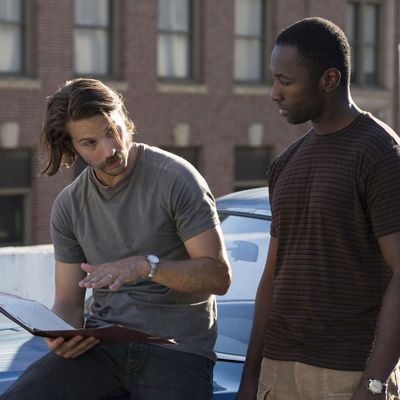
Quarry, a show about a disillusioned Vietnam veteran (Logan Marshall-Green) boozing and glowering and blasting his way through the Memphis underworld, doesnÔÇÖt always work as drama. The first few episodes of this Cinemax series may seem predictable to fans of post-Vietnam crime tales like Dog Soldiers┬áand Cutter and Bone, an unfair but inevitable complaint ÔÇö this material surely felt fresh in 1972, when Max Allan Collins published the first of 13 Quarry books, and it sometimes makes the mistake of believing its heroÔÇÖs pain is as inherently fascinating to us as it is to Quarry and his loved ones, even though heÔÇÖs emotionally closed off a lot of the time.
Quarry and his best friend Arthur (The WireÔÇÖs Jaime Hector) come home stigmatized by their participation in a My LaiÔÇôtype massacre and get tangled up with a grinning, chatty crime boss known as the Broker (Peter Mullan in the Peter Mullan part), who offers each of them $35,000 to join his gangster army. QuarryÔÇÖs wife Joni (Jodi Balfour) seems inclined to stick with Quarry even though itÔÇÖs like sleeping beside an unexploded bomb, and even though she secretly made decisions while he was away that heÔÇÖs guaranteed to, um, dislike. The show dives into QuarryÔÇÖs despair and numbness and puts plenty of space between his brutal acts, giving both Quarry and the viewer the time to reflect on the magnitude of whatÔÇÖs happened. But even though this seriousness is commendable in theory, it leaches any pulpy excitement from the story and makes the show seem entombed by fatalism. Quarry quickly runs into its own version of the same problem that afflicted the hero of Vinyl: When you show your main character hitting rock bottom before the pilot is even done, then stay in the pit with him for weeks with no end in sight, audiences may rightly wonder what kind of mission theyÔÇÖve signed up for and how long it will continue in this vein.
Obviously, series creators Graham Gordy and Michael D. Fuller ÔÇö formerly of Rectify ÔÇö have options. The long-term story could focus on QuarryÔÇÖs redemption or spiritual reawakening, his hardening into moral numbness, his uneasy d├®tente with the facts of criminal life, or some other theme common to antihero television. But life is long, and television will eat it all up if you let it, and even though IÔÇÖm normally an easy mark for this kind of subject matter (I saw The Indian Runner twice in a theater), all the images of the sweaty, soul-sick Quarry boozing and chain smoking and yelling at Joni and putting his head down on bars and smashing furniture and going off to kill more people eventually wore me down in a bad way. The show strikes a particular note with great variety, but there are 87 other notes on a keyboard and you start to miss hearing them. ThereÔÇÖs only so much that Marshall-Green ÔÇö a subtly emotional actor whose stringy hair and handlebar mustache suggest Paul Rudd playing Ron Kovic ÔÇö can do to bring us inside this tortured manÔÇÖs psyche and help us see it as something other than tortured.
ThereÔÇÖs comic relief, courtesy of QuarryÔÇÖs new partner, Buddy, a philosophical imp who lip syncs Harry Nilsson in his underwear and says things like ÔÇ£Bingo was his name-o, kill him graveyard dead!ÔÇØ while hammering nails into the business end of a bat; the character is played by JustifiedÔÇÖs Damon Herriman, an actor youÔÇÖre always glad to see. And technically, the series is so impressive that I might keep watching it just for the filmmaking. ThereÔÇÖs an astonishing long take in the first episode thatÔÇÖs a marvel of real-time catharsis; a deep-cuts soundtrack of rock, blues, and country; lots of scenes set in live music venues that let us savor the performers before cutting to the plot, and the most believable mid-century American production design since Mad Men. Check out the signage in the backgrounds of shots, the cassette recorder that Joni uses to tape ÔÇ£lettersÔÇØ to Quarry, the sequence in episode two where Quarry and the Broker watch local pro wrestlers, and that ugly-awesome end table in Quarry and JoniÔÇÖs house that has an alarm clock built into the side.
Best of all is the seriesÔÇÖ Method-like immersion in a time and place. You rarely feel as though 21st-century urban liberal values are being inappropriately superimposed on a story set in a multiracial American South in 1972, to provide think-piece cover for the storytellers. Gordy and Fuller and all of their collaborators have a keen grasp of who these people are and whatÔÇÖs at stake for them, as well as a sense of the forces that shaped them and that still weigh on them. But these are all compliments that one could just as easily pay to a movie or mini-series, and Quarry is yet another new show that feels (for now, anyway) as if it shouldÔÇÖve gone that route.


